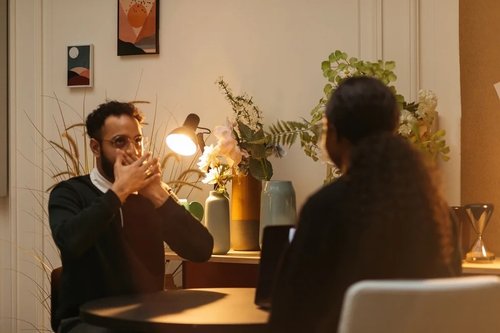10 tips for a stress-free job interview
Jan 02, 2020
5 mins


Journaliste - consultante éditoriale @rubrik-communication.com
Your voice is trembling, your handshake is clammy and you’re talking too fast. Your interviewer will probably be able to tell when you meet that your stomach is in knots. It’s normal—and almost a good sign—to feel a little stressed before a job interview, but being overly anxious can make you flustered and perhaps spoil your chances of getting the job. Rest assured, here’s how to approach a job interview with the utmost calm so you can show just how much you are truly worth.
1. Change your perspective
A fear of being judged is often the main reason behind interview stress. Low self-esteem, not possessing all of the required skills, a chaotic career path, and strong competition might make you feel that you won’t live up to an interviewer’s expectations. Stop right there! If you have been offered an interview, it is because your resume suggests that you have the potential to fulfil the company’s needs.
Instead of treating the interview like an exam, think of it as an opportunity to find out more about the job and to see if your profile and expectations match those of the company. This takes a lot of pressure off and readjusts the balance between you and your interviewer. In a discussion between two professionals, regardless of age gap or different levels of experience, you will feel more comfortable, and your interviewer will recognize this.
2. Prep yourself for the exchange
To reduce your stress levels even further, do your research before you show up. Find out about the company, its competitors and its market. At least take the time to read the company’s website and browse its social media accounts.
Take stock of your own situation, too. Review your reesume carefully and try to anticipate any questions that may come up. That nine-month employment gap between 2014 and 2015, for example? Or your two years’ plumbing experience, even though you are applying for a job in sales? Prepare clear answers and you won’t be caught off-guard, feel embarrassed and start babbling.
3. Rehearse, rehearse, rehearse
Practise answering three main questions, either alone in front of a mirror, or with someone you trust. Who are you, beyond your resume? Why do you want this position? Why this company? By preparing these responses, you will be able to put forward relevant arguments, and you won’t stumble over your words or have to deal with any awkward silences.
4. Get a good night’s sleep
If you have trouble falling asleep or are restless in the nights leading up to an interview, your stress levels will rise even further. First, check that your bedroom is set up for a good night’s sleep: think quality bedding, sufficient darkness (use shutters or black-out curtains), and no noise whatsoever—wear ear plugs if necessary.
Turn off your cellphone or put it on airplane mode. Avoid doing any sport or eating at least two hours before going to bed, and give up stimulants such as coffee and alcohol. In the evening, get stuck into a book or read a magazine—you need a distraction from this interview, which seems to be taking up all of your headspace.
5. Plan your journey
If you want to start the big day with even more peace of mind, look at the logistics—directions, travel time, and so on—the day before, at the very latest. Give yourself leeway just in case there are traffic disruptions, transport delays, or parking problems. Planning ahead will also give you time before you go into the interview to relax with a hot or cold drink, take a few deep breaths, and find your focus. Don’t add to your stress levels by arriving drenched in sweat with a dry mouth because you had to rush there, or worse still, by actually being late. If this happens, you would definitely be off to a bad start with any potential employer and you would feel incredibly uncomfortable.
6. Choose the right outfit
Select clothes that match the company’s dress code and style, but make sure you choose an outfit that makes you feel confident. If your clothes are too tight, or you’re trying to dress like someone you’re not, your discomfort will be obvious. Are you applying to a bank? If you think that a suit is an absolute must, choose one in a cut and a color that reflects who you are, puts you at ease, or even better, boosts you confidence. Are you applying to a small start-up with a relaxed ethos? You can still dress for the occasion without a tie or high heels. Above all, wear something that feels comfortable and don’t overlook the details.
7. On the big day, breeeeeathe
So here you are. You arrive at the front desk a few minutes early and the receptionist directs you to a waiting area. The other candidates might also be there, waiting for their turn. Stay standing or take a seat; whichever feels the most comfortable for you. If you can feel your heart racing, start taking a few deep breaths. Focus on your breath. Inhale for a count of four, hold your breath for one, exhale for four, hold it for one, and repeat until your heartbeat slows and you feel calmer. Have a drink of water and avoid coffee or any other stimulants.
8. Concentrate during the interview
Like an actor who is about to go on stage, tell yourself that your stage fright will fade quite quickly once you are in front of your audience. However, it will depend on the attitude of your interviewer, too. If you find them intimidating, try to remember that you may well be the right person to fulfil their company’s needs. If they make you feel at ease, stay focused and listen attentively.
Be aware of your posture and body language. For example, are you sitting up straight? Are your hands visible or are you ripping off your fingernails under the table? When we get nervous, our bodies can shake, so if you start trembling in the middle of an interview, try contracting your butt and thighs to make the shakiness stop.
For those of you who go to the other extreme and try to hide discomfort by being overly casual, watch out! That definitely won’t come across well either. If you’re still feeling anxious during the interview, return to your deep breathing. If you are shy you might find your interviewer’s eye contact overbearing, so start taking some notes. This will help to break the tension and it also gives you the chance to write down some questions and come back to subjects you might want to elaborate on.
9. Consider getting some therapy
No matter how much you prepare for an interview, nothing helps. The stress continues to eat away at you. The prospect of an interview haunts your days and nights; it’s essentially a living nightmare. You don’t have to suffer in silence. There are all sorts of therapies and treatments that can help to reduce or even eliminate anxiety. For example, phytotherapy, which uses plant-derived medications, can prevent anxiety attacks. Acupuncture, hypnosis and sophrology relaxation sessions, which are inspired by meditation and yoga techniques, can also help to remove the stumbling blocks responsible for stress, and improve your self-confidence and your self-esteem.
10. Pursue a stress-busting sport
The best activity by far to relieve stress is sport, which helps our bodies to release feel-good hormones called endorphins. In terms of anxiety management, some disciplines are particularly effective, such as yoga, swimming, tai chi or qigong (which is similar to martial arts). However, even the most basic activities, such as 30 minutes of jogging three times a week, are great for stress relief.
The idea of an interview is usually more stressful than the actual interview itself. We are often our own biggest critics and judge ourselves much more harshly than others do. Put things into perspective: getting an interview is already a victory in itself. Prepare properly, learn to acknowledge your virtues, and remember that you have nothing to lose, but everything to gain.
Your life is not at stake in an interview; of course, you want the job, but if you don’t get it (because, despite your qualities, another candidate may be a better fit), tell yourself that this isn’t the end. Every step you take will inevitably lead on to other opportunities.
Translated by Mildred Dauvin
Photo: Welcome to the Jungle
Follow Welcome to the Jungle on Facebook, LinkedIn, and Instagram, and subscribe to our newsletter to get our latest articles every day!

More inspiration: Job interview survival guide
Ace your job interview with our comprehensive guide. From preparing for different recruiters to managing informal moments, our tips and techniques will help you shine.

Beyond the basics: advanced strategies for researching a company before an interview
Want to show off your knowledge and impress the recruiter? Don't skip out on the in-depth researching stage of preparing for an interview!
Mar 29, 2023

Interview faux pas: 10 mistakes you didn't know you were making
Want to ace your next job interview? Here are 10 common mistakes to avoid, according to career expert Alan Stein.
Mar 21, 2023

People-pleasing in an interview: how a minion mentality can derail your career
"Yep, sure, no problem, I can do that!" People pleasers, beware. Overselling yourself to the recruiter could come back to bite you...
Dec 13, 2022

Interviewing with a friend: the pros, the cons, and how to handle it
Thanksgiving is the perfect time for catching up with loved ones, eating great food, and ... networking?
Nov 22, 2022

The secret art of selling yourself in an interview
Beyond convincing the recruiter your skills and experiences are relevant, you need to be able to sell YOU. A personal branding expert shares his tips.
Nov 10, 2022
The newsletter that does the job
Want to keep up with the latest articles? Twice a week you can receive stories, jobs, and tips in your inbox.

Looking for your next job?
Over 200,000 people have found a job with Welcome to the Jungle.
Explore jobs